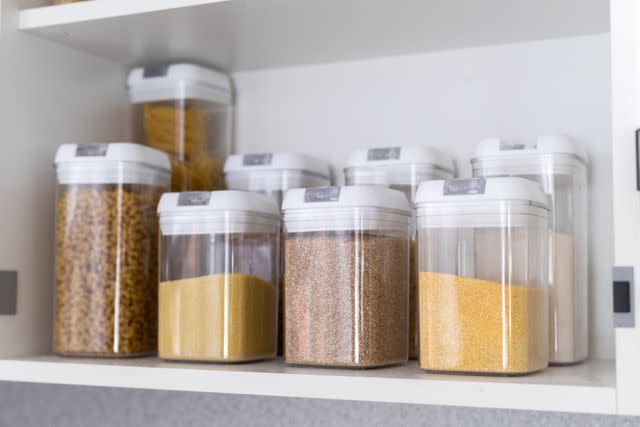7 Items You Shouldn't Keep in Your Pantry, According to Pros
Reviewed by Katherine Picott
Pantries are generally understood to be the spot where dry goods and non-perishables are kept. However, as it turns out, not all dry goods should be stored in the pantry.
Aside from the obvious items like meat, dairy, eggs, and other perishable food. there are a few things that are commonly stored in the pantry that you should really be storing elsewhere. Here are 7 items that you should never keep in your pantry.
Meet the Expert
Wendy Trunz is Partner and Head Organizer at Jane's Addiction Organization in Long Island, New York.
Steve Ip is the owner of Cleanzen Cleaning Services, a maid and house cleaning service based in Boston, Massachusetts.

Olga Shumytskaya / Getty Images
Nuts and Seeds
Nuts and seeds are a common pantry item; however, once opened, they should be transferred to an airtight glass container and stored in the fridge, says Wendy Trunz, partner and head organizer at Jane’s Addiction Organization in Long Island. This is because nuts and seeds are high in unsaturated fats, which can go bad quickly. When properly stored in the fridge, nuts and seeds will stay fresh for as long as four to six months.
Open Flour and Baking Soda
Open pantry items like flour and baking soda should never be put back into a pantry unsealed, Trunz says. This is because, if left unopened, these types of items are sensitive to pests and are at risk of going bad more quickly. In addition, baking soda easily absorbs odors and may begin to absorb the smells of any highly scented items around it such as spices, garlic, and onions, for example.
While it may be tempting to throw these items back in the pantry in their original bags and boxes, flour and baking soda should always be transferred to airtight containers before being returned to the pantry. That being said, if you plan on storing these items for longer than eight to 10 months, they should actually be placed in the fridge instead to ensure they are kept fresh.
Pet Food
It may feel convenient to store your pet’s food in the pantry, particularly if you feed them in the kitchen every day. However, experts agree that pet food is best stored in an airtight container away from the human food in the house. Not only does it smell strongly—you don’t want your pantry items to absorb the smell and start tasting like kibble—but it is also attractive to pests, which could spread and become a problem. Instead, keep your pet’s food in a sealed container in a designated cupboard outside of the pantry.
Fruit
Most fruit can be stored on the counter until it’s eaten (think bananas, apples, mangos, and pears), but it’s never a good idea to store it in the pantry. Fruit is highly attractive to pests like fruit flies and ants and can quickly introduce these pests to your other pantry items. Plus, fruit goes bad quickly, so it’s best kept in an area where you can keep an eye on it and remember to eat it up before it starts to go mushy. Keep uncut fruit on the counter in a fruit bowl, and any leftover pieces that you’ve opened or cut in an airtight container in the fridge.
Certain Types of Cooking Oils
Cooking oils like olive oil and vegetable oils are a common pantry staple, but not all oils can be safely kept in the pantry, says Trunz. Oils that are high in unsaturated fat should always be stored in the fridge to keep them fresh and prevent spoiling. This includes sesame oil, saffron oil, nut oils like walnut and pistachio, and infused oils.
Opened Condiments
Before they are opened, condiments like ketchup, mayonnaise, and mustard can be stored in a cupboard or pantry without issue. However, once the freshness seal is removed and the condiments are used for the first time, they should be stored in the fridge to prevent them from going bad.
Cleaning Products
Cleaning products are another non-food item that can make their way into pantries due to convenience. However, cleaning products should definitely be kept out of the pantry, says Steve Ip, owner of Boston-based maid and house cleaning service Cleanzen Cleaning Services. This is because just like any liquid, accidental leakage or spills of cleaning products can occur in a pantry, contaminating your food products. Instead, Ip recommends storing your cleaning products in a safe, dry location that out of reach of children and pets, such as the laundry room.
Read Next: How to Clean Out Your Pantry in 4 Easy Steps
Read the original article on The Spruce.

